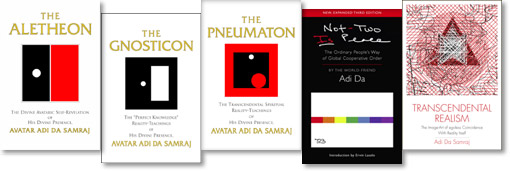
|
Exegesis: What It Is and
|
||||||||||
 |
 |
 |
 |
 |
|
click image to enlarge
|
||||
All the world's great religions provide such a framework for exegesis of their sacred scriptures. In other words, they don't just provide the text alone, or just write an introduction to a sacred book, and leave it at that. They do much more: they provide "line by line" elaboration, footnote insertion, etc. of each nuance of each sentence, of everything worth knowing about the context of that sentence, etc. For example, for students of Judaism, the Midrash "fills in many gaps left in the biblical narrative regarding events and personalities that are only hinted at." [Samuel Rapaport, Tales and Maxims from the Midrash]
The greatest scholars and Realizers of a religion or spiritual way have traditionally provided the commentaries. For instance, Adi Shankara, a great Realizer himself, wrote extensive commentaries on the Brahma Sutras and the Bhagavad Gita. Adi Da's Gnosticon and Pneumaton include profound commentaries on many traditional sacred texts, including The Ribhu Gita, Maneesha Panchakam ("Five Verses on Wisdom"), Shankara's Dasasloki ("Ten Declarations"), the Devikalottara, and The New Testament.
Because such commentary has been created often over a period of many centuries, for any given paragraph of a sacred scripture, you frequently can read the commentary from not just one but many commentators.
And then, regardless of the tradition — whether one is a Christian engaged in "Bible study", a Hindu studying the Bhagavad Gita, or a Jew studying the Tanakh — one has access to this very full commentary as one is studying. Not too surprisingly, given that we are now in the 21st century, there now are many software-based or Web-based study aids for doing "Bible study", study of the Bhagavad Gita, etc.
The sacred texts of Adidam very much deserve this same degree of support, and their study would be aided greatly by having a suite of tools that support exegesis of each text (as well as each of Adi Da's talks and essays, and even the countless brief, memorable quotes from Adi Da that are circulating around the Web every day), along with a group of Adidam scholar-devotees dedicated to creating such tools. Hence this article, as a starting point with that goal in mind.[1]

 Birth, Life & Death
Birth, Life & Death

186,104 people have liked our site's pages and shared them with their Facebook friends - Most Shared Pages
© 2025 Copyrighted materials used with the permission of The Avataric Samrajya of Adidam Pty Ltd, as trustee for The Avataric Samrajya of Adidam. All rights reserved. None of these materials may be disseminated or otherwise used for any non-personal purpose without the prior agreement of the copyright owner. ADIDAM is a trademark of The Avataric Samrajya of Adidam Pty Ltd, as Trustee for the Avataric Samrajya of Adidam.
Technical problems with our site? Let our webmaster know.